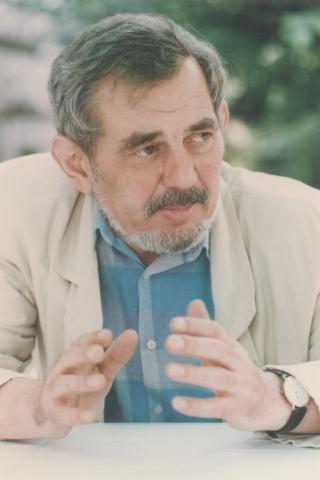Bella István: Biography
István Bella (Székesfehérvár, 7 August 1940 – Budapest, 20 April 2006)
Kossuth and Attila József Prize-winning poet, literary translator, and member of the Digital Literature Academy from 2003 until his death.
*
He was born on 7 August 1940 in Székesfehérvár, but grew up in a small village. His father was a teacher, and thus a man of some standing in the community.
However, the childhood idyll soon came to an end when István Bella Sr. was enlisted as a corporal in the Second World War and died after being taken prisoner of war in November 1944. The circumstances of his death remain unknown. One of Bella’s most significant poems is „Funeral Oration” („Halotti beszéd”), a reflection on this early tragic experience. The absence of his father would accompany the poet until his death, but fate had assigned to him several great men as father figures.
Bella was only 14 years old when his poem, „On the Way Home” („Hazafelé”), appeared in a local newspaper. He attended secondary school in Székesfehérvár. His family lived in difficult circumstances; his mother was a labourer, and her income only allowed a modest living. At the school in his home village, he began reading the literary magazines of the era (Irodalmi Újság, Csillag, Új Hang) at a very early age. In high school, his interest deepened. The events of the 1956 revolution gripped him. He also wrote poems, but they were not published. He took part in several demonstrations, such as taking food and clothes to a village, and collecting for those struggling in Budapest.
He did not get into university at first, but later he was able to start his studies at Eötvös Loránd University in the faculty of Hungarian Literature and Library Science. He became involved in literary life, and in the mid-1960s he contributed to the compilation of an anthology of contemporary poets, Tiszta szívvel (With a Pure Heart). His poems were also published in Új Írás and Napjaink.
István Bella’s poetry is particularly influenced by the folk poetry tradition, archaic language, and modern twentieth-century trends. The power of language and the constant presence of song are important characteristics of his work.
Bella’s first book of poetry, Scattered World (Szaggatott világ), was published in 1966. The characteristics mentioned above can already be detected in this volume, although it is the basic layers of rural childhood, orphanhood, and hard fate that are predominant. His volumes then follow one after the other, although there are some „idle periods” in his career as far as the regularity of his publications is concerned. And there are some particularly memorable poems, in addition to those already mentioned, such as the „Song of Sárkeresztúr” („Sárkeresztúri ének”), „Testament” („Testamentom”), „Our Love-makings” („Szeretkezéseink”), „Self-Portrait” („Önarckép”), or„Verbs and Yokes” („Igék és igák”).
His children’s poems and various works connected with music are a special feature of his career, the most notable of which perhaps being The Passion of Margaret (Margit-passió). Translation is also an important part of his oeuvre, especially in the field of translating the folklore of certain Finno-Ugric ethnicities and in service of many figures of Polish literature.
From 1971 to 1977, István Bella was a factory journalist at Magyar Papír, while also working as an educator at the Paper Industry Company. He was also a librarian at the Hungarian Railway Company and editor-in-chief of the local television station at Székesfehérvár in the 1990s. He spent many years on the editorial board of Élet és Irodalom, was a member of the editorial board of Árgus magazine, and a regular contributor to Magyar Napló. After the regime change in 1989, he also worked as a book publisher.
He was a member of the Hungarian Academy of Arts.
István Bella died on the night of 20 April 2006.
The biography was written by István Bakonyi, translated by Benedek Totth and Austin Wagner.

